Connecting with nature can benefit Autistic children and their families
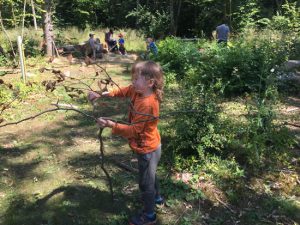 A growing number of studies indicate that being involved in activities outdoors provides multiple benefits for children on the Autistic spectrum, particularly with emotional regulation.
A growing number of studies indicate that being involved in activities outdoors provides multiple benefits for children on the Autistic spectrum, particularly with emotional regulation.
For children on the spectrum, who may more often participate in therapies provided indoors rather than outdoors, being in a wild woodland environment can provide a sensory feast involving not only physical activity but visual, textural, sound and smell experiences.
Activities taking place in a naturally stress-reducing woodland environment can benefit individual children and family units as a whole, helping with delivering positive mood states and reduction of anxiety of both children and parents.
Activities at family sessions vary according to season. Den-building, mini-beast hunts, scavenger hunts and orienteering games are usually on offer, along with seasonal arts and crafts and cooking over an open-fire,. Opportunities for tool use might include saws, and drills.
The session Leader is Susan Collini, who is a qualified teacher, Level 3 Forest School leader, Level 3 Social Forester and Level 3 Mindfulness in the woods practitioner.
The location for our family sessions are at Oxlip Wood, near Sudborough in East Northants, not far from the towns of Oundle,Thrapston, Kettering and Corby,
The following 6 sections are designed to explain various ways that our woodland family sessions can benefit children on the Autistic spectrum.
1. Physical activity
Taking part in physical activities outdoors is beneficial to general wellbeing for both children and adults. However, for some parents with a child on the Autistic spectrum a trip to an outdoor play area can be fraught with difficulties, even though the play equipment on offer would seem to be ‘just the ticket’.
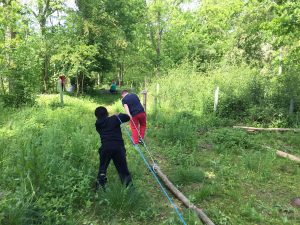 Children don’t need fancy climbing frames and play equipment to extend their physical abilities, they just need an outdoor environment that’s challenging enough to extend their physical abilities, without putting them at risk of serious harm.
Children don’t need fancy climbing frames and play equipment to extend their physical abilities, they just need an outdoor environment that’s challenging enough to extend their physical abilities, without putting them at risk of serious harm.
Just moving around within a wild woodland can bring more muscle groups into play, through need for co-ordination and balance skills working together in order to pick out where to place each foot to avoid potential trip hazards.
Children love to construct their own adventure playgrounds, using logs and branches that we arrange to be piled up for use by our woodland visitors, by-products of the ongoing felling activities that are part of the woodland management plan.
Moving some of these logs from A to B around the woodland is a favourite activity with youngsters, fine motor skills being required for tying appropriate knots, while gross motor skills are developed through the actual dragging of the logs.
Read about our dedicated SEN sessionsr
2. Emotional regulation
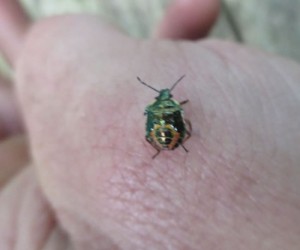 The richness of a woodland environment provides plenty to bring a smile to a child’s face, whatever the time of year.
The richness of a woodland environment provides plenty to bring a smile to a child’s face, whatever the time of year.
Coming across a beetle in the long grass or a butterfly fluttering among the brambles can capture and focus attention, helping to reduce anxiety and promote relaxation.
Even the breeze rustling the leaves and the shadows dancing on the ground can be enough to provide a focus for attention that helps promote a sense of calm and promote emotional regulation.
Nature connection experiences in a free play environment can encourage development of emotional regulation, fostering sucessful reactions and interactions with others..
Read more about our SEN sessions
3. Speech development
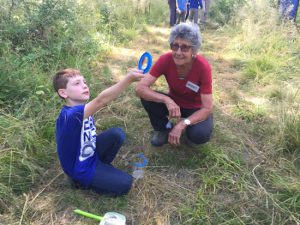 Being outdoors can help promote speech development, without it being perceived by the child as a ‘educational’ activity or part of a therapy session.
Being outdoors can help promote speech development, without it being perceived by the child as a ‘educational’ activity or part of a therapy session.
There’s always something new to be noticed when you’re outside, due to seasonal changes or just the weather conditions on a particular day. There’s a wealth of starting points, for promoting two-way dialogue, both verbal or non-verbal, occurring through interactions with resources found naturally in an outdoor environment.
Just walking slowly, looking around and noticing new things, whether changing smells with the seasons, the sound of Red Kites soaring above, or animals rustling about in the undergrowth all provide opportunities for extending vocabulary and speech development. The resources that are available in the natural world outside are infinitely far richer than those available indoors.
The child featured in the picture sat down of his own accord and began to use stones to construct his own building. Supported and encouraged by one of our volunteers, using open ending questioning, the outcome objective wasn’t to do with the finished product, but extending the child’s vocabulary through talking about the play activity he was involved with.
Read about our dedicated SEN sessions
4. Learning skills
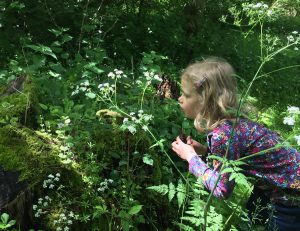 Being outdoors, especially in a truly wild environment, provides opportunities for multiple learning experiences. Whether learning to recognise a plant that might scratch or sting you, or learning the names of the plants that grow in the woodland, the outdoors is richly resourced as a source of learning.
Being outdoors, especially in a truly wild environment, provides opportunities for multiple learning experiences. Whether learning to recognise a plant that might scratch or sting you, or learning the names of the plants that grow in the woodland, the outdoors is richly resourced as a source of learning.
Allowing children to explore a wild environment can be more scary for the parents, who might worry about their children coming to harm. However, it is the fact of the child being allowed to take risks in a wild and somewhat unpredictable environment that promotes valuable and life-long skills related to awareness and risk-management.
Even learning the value of walking rather than running in a wild woodland, or you’re likely to fall over, is valuable learning, promoting awareness that is the first step in successful risk management. It’s an important aspect of growing up, learning to take responsibility for one’s own actions; doing so helps build self-confidence and self-esteem.
Read about our dedicated SEN sessions
5. Decreasing sensitivities
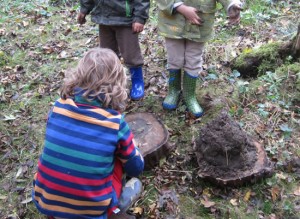 Hypersensitive behaviours associated, for example, with touching grass or getting slightly dirty are not confined to children on the Autism spectrum. However, hypersensitive behaviours related to the outdoors can be decreased in family sessions over time, with careful planning and appropriate support.
Hypersensitive behaviours associated, for example, with touching grass or getting slightly dirty are not confined to children on the Autism spectrum. However, hypersensitive behaviours related to the outdoors can be decreased in family sessions over time, with careful planning and appropriate support.
Being in a wild woodland environment provides great facility for incremental exposure to ‘anxiety aspects’ associated with the natural world. It’s really heartening to see a child who initially wouldn’t want to play with mud, begin to do so with gusto and obvious sensory enjoyment.
The way desensitising might start, for example, is by activities being within the totally earth and plant-free area that exists within the open wood barn, or perhaps through visiting the wood on a sunny and dry day when transfer of woodland material to hands, shoes and clothing is going to be of little issue.
With careful guidance, encouragement and repeated visits to the woodland, familiarity and reduction in anxiety levels can help decrease extreme responses and lower hyper-sensitivities.
Read about our dedicated SEN sessions
6. Social interaction
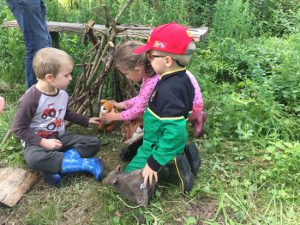 We all interact better with others when we feel relaxed and studies abound that by just spending time in a wild woodland environment can help lower anxiety levels and promote relaxation.
We all interact better with others when we feel relaxed and studies abound that by just spending time in a wild woodland environment can help lower anxiety levels and promote relaxation.
Whether it takes a child several weeks or several months to improve their social interactions, or increase eye contact, opportunities abound by the mere fact that they will need help from others with most woodland-related activities.
For example, if a child wants to move large pieces of wood, or walk through a dense patch of woodland, they’re likely to need someone to support them that inevitably requires a level of social interaction.
Once a child can do something there’s opportunity to help someone less-able or less confident with the same activity. Helping someone else can boost self-confidence and self-esteem and also provides important practice in making successful social interactions.
In a wild woodland environment the opportunities for social interaction with adults and other children are many, because many a successful game or activity outcome requires an element of teamwork.
How Outdoor Tribe can benefit children on the Autistic spectrum
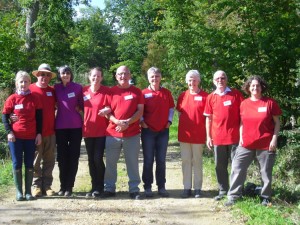 Our work with children on the Autistic spectrum and their families takes place in Oxlip Wood, a 20 acres privately owned woodland, situated in the middle of fields and completely fenced-in (to keep the deer out).
Our work with children on the Autistic spectrum and their families takes place in Oxlip Wood, a 20 acres privately owned woodland, situated in the middle of fields and completely fenced-in (to keep the deer out).
The fact the wood is fenced helps reduce parental anxiety levels and concerns about a child becoming lost and associated ‘stranger danger’. Oxlip Wood has one main access via its own private track that leads from the main road. There are no public rights of way through the wood,
Susan Collini, a level 3 Forest School Leader, registered on the professional register of practitioners at the Forest School Association. Susan is assisted on family sessions by volunteers who are DBS checked and who have received training in delivery of woodland learning activities, in relation to both children and adults.
Outdoor Tribe principles that underpin our family sessions
The family sessions we run are underpinned by a set of principles that we need parents to take on board.
- All sessions take place within a woodland environment, to promote a relationship between the learner and the natural world.
- Learning through play is at the core of our provision.
- Our objectives are to extend children’s learning through supporting them to take incremental increases in levels of risk associated with what they, as individuals and as part of a group, are involved with. (We observe and assess individuals and situations, then risk-manage activities accordingly)
- The taking of risk by those attending sessions can be related to physical activities, social interactions or even emotional growth related to self and others.
- A wild woodland is full of naturally occurring hazards, with associated risks that we strive to lower to levels considered reasonable and appropriate for the age and cognitive abilities of our learners. However, there has to be acceptance by parents and carers that a wild outdoor environment is impossible to risk manage to levels associated with provision of indoor activities,
- Learning to take risks is not just for the children, but for adults too. Being willing to allow children to extend themselves through being involved in taking risks, designed to build self-confidence and resilience, can be quite a scary prospect for some parents..
- Family sessions are as much to do with facilitating learning by the adults as the children,
- Sessions are run by a qualified Level 3 Forest School Leader who practices according to professional practice principles set down by the Forest School Association.
- Parents (carers) need to recognise that for successful developmental outcomes, attendance needs to be for a minimum of 6 sessions, with no more than 2 weeks between each session.
Outdoor activities have plenty of benefits on offer for children on the Autistic spectrum, especially if the nature of the activities on offer are designed to reduce triggers for behaviour patterns linked to hyper-sensitivity issues.
We like to work with family units, certainly to begin with, but are happy to work with children without their parents being present once we feel the child is comfortable with both the environment and staff.
You can read more about Forest School to understand how it relates to the sessions we provide for children on the Autistic spectrum and their families.
If you’d like more information about our family sessions up at Oxlip Wood, please fill in a short form or call Susan Collini direct on either 01933 623918 or 07799 892900.
What to do next?
Click on the button to find out about our next dedicated family session for those with SEN children
Read feedback about our SEN sessions
Further reading
The benefits for children on the Autistic Spectrum to gain from nature

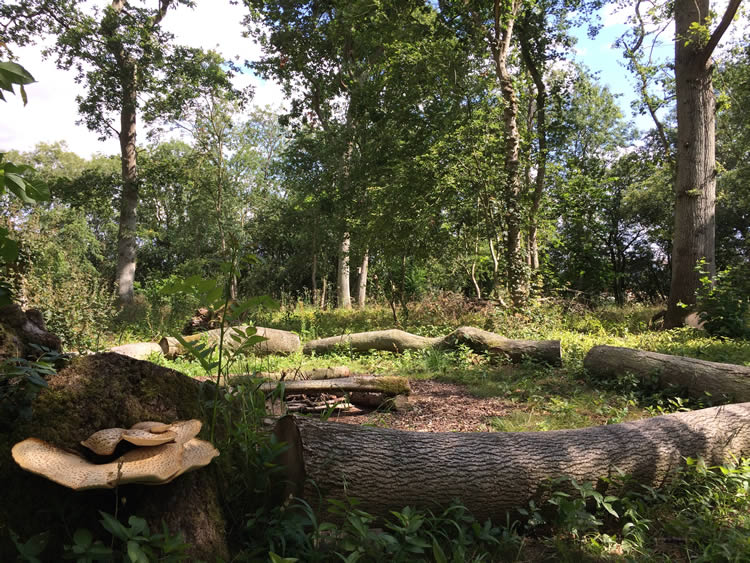
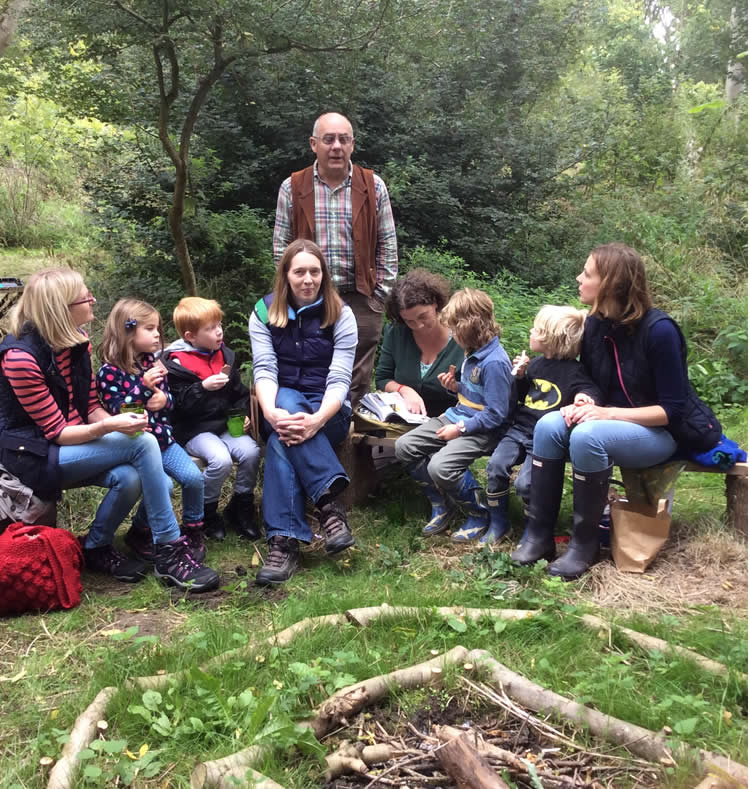
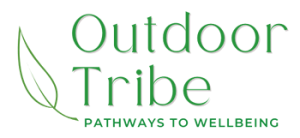
Very interested for my son with ASD
Where are you based? If you’d like to visit the wood for a parental preview you’d be very welcome.
Can’t wait to come and enjoy the wood again, although I walk with aids I was able to enjoy it and my kids loved it so much and would love w to attend forest school xxxxx
Great to meet you and your family Louise. Pleased you got so much from your first visit and look forward to welcoming you again soon
Hi my son has high functioning ASD and he is currently struggling with social interactions. He finds it hard to factor in his friends having feelings and plans that are different to him. We have also been having some big meltdowns which have resulted in him running around the house throwing things and screaming. We saw this post and just thought it would be a very calm and de stressing for us all. I would love some more information. Thank you
Spending time in the woodland would undoubtedly be beneficial and I’ll drop you an email so we can start an exchange of information.
Hi Susan I have two autistic boys who I think would greatly benefit from this. Please could you send me some more information on how to book with yourself and prices, times you’re open etc.
HI there i’m doing a level three in forest school to become a leader and I was reading your findings about the wellbeing for Autistic children that can benefit from woodlands. I was wondering if you could tell me how you conducted the study such as how well it went or if it could be improved, the timescale, sample group how you collected the findings and social economic background Nicky Davies
Hi Nicola, Apologies for not replying to you before now, I’m afraid I missed reading this comment. This is a large subject to cover in this type of forum. Perhaps you could contact me via the contact form on the website and we can start a conversation. Thank you
This blog really hits home for me. I’ve seen firsthand how nature can be incredibly therapeutic for my child with autism. Our Autism support workers often recommend outdoor activities, and it’s been amazing to watch how my son thrives in a woodland setting. The physical activity, the chance to explore, and the sensory experiences all seem to help with his emotional regulation and social skills. It’s a refreshing change from indoor therapies and really gives him a chance to just be a kid.